
For the first time, the Borneo Bird Race – till then an annual event in the neighboring state of Sabah – had become a movable feast, transferring to the Kuching area before moving on for a final day in Brunei. There were five teams participating: from Japan, Thailand, the Philippines, India and Sabah itself.
I was there as a helper rather than as a participant - and to celebrate the fact that international birding had finally come to Sarawak in a big way. I had been gently pushing for this since 2010, when I made a presentation on the subject to the Sarawak tourism industry. Since then we had had two training sessions for guides, both reported on this blog - one at Kubah in 2012 and another at Borneo Highlands in 2014. This was a payoff - and as I believe that international birding can be a direct incentive for conservation, a very good thing for Sarawak. If I look happy in this photograph, it is because I was very happy indeed.
With the blast of a horn (sounded by Mary Wan of the Ministry of Tourism Sarawak), the race was under way. Teams headed off in various directions...
...while I joined the birders heading up to my favourite site, the overlook at the Indonesian border.
The combatants kept their eyes on the treetops, trying to amass as large a species list as possible. As I was not actually racing, I spent most of my time looking for photographic subjects.
Birds can be tricky to photograph at Borneo Highlands, as most of them tend to stay in the canopy. Here, for example, is a typical neck-cracking view of a Green Iora (Aegithina viridissima).
I had better luck with this female Lesser Cuckooshrike (Coracina fimbriata).
By and large, though, despite the fact that this was a bird race, once I got back from the overlook I found my camera turned more often to other things. These included the local dragonflies and damselflies, such as this male Orthetrum pruinosum.
Heliocypha biseriata is common along rocky streams near the resort. The male is particularly handsome....
... But the subtler female is also well worth a look.
Among the tinier damselflies around the resort was this Prodasineura verticalis.
Coeliccia flavostriata is endemic to northwestern Borneo, where it appears to be quite common, especially in the highlands.
The beautiful emerald damselflies of the genus Vestalis are common at Borneo Highlands, but identifying them to species from photographs is well-nigh impossible.
I nearly always find Vestalis damselflies perched atop, or at the tip of, a broad rainforest leaf. Males, like the insect in the lower photograph, have longer and slimmer abdomens than do females.
I had thought, when I photographed these two females, that I was clearly dealing with two species, one with a copper cast to the thorax and another largely emerald green. However, colour is less important for identification than details of the genitalia, so I am far from sure. Rory Dow found three species at Borneo Highlands in 2012, V. amnicola (or a very similar undescribed species), V. atropha and V. beryllae (which has an extremely elongate abdomen, so these probably represent one or both of the other two).
Other insects continued to distract me from the business of the bird race. They included this peculiar moth doing a headstand on a dead leaf.
Borneo Highlands is an excellent spot for butterflies, though on this visit I was only able to photograph a few common species. These included two widespread members of the genus Yphthima, the Common Five Ring (Yphthima baldus)...
...and the Common Three-Ring (Yphthima pandocus).
Horsfield's Baron (Tanaecia iapis) is one of the commoner forest butterflies at Borneo Highlands; this is a male.
Birders, who spend their time looking up in trees, may be more likely to come across flying dragon lizards (Draco sp.) than even lizard fanciers. Identifying them to species once found, however, can be a lot harder, and I do not know which one this is.
Insects and lizards are interesting enough, but the biggest distraction for visiting birders at Borneo Highlands is surely the beauty of the forest itself.
Unusual plants are everywhere, and I only wish I could tell you what most of them are. I do know that this is a ginger, probably Etlingera pubescens...
But I have no idea what these lovely cornflower-blue flowers might be...
Nor these...
Nor this odd bunch of fruit, though I suspect that, again, this is a ginger of sorts.
These fruits littering the forest floor look very much like acorns, and for all I know may be from an oak-like tree; trees related to oaks (eg Lithocarpus, Castanopsis) are found in many of Borneo's montane forests.
This impressive epiphyte is one of the many Bornean members of the arum family (Araceae).
These are the fruits of an understorey palm.
 This rather repellent-looking growth on the forest floor appears to be be a fungus of some sort. Other forest-floor fungi at Borneo Highlands are more attractive...
This rather repellent-looking growth on the forest floor appears to be be a fungus of some sort. Other forest-floor fungi at Borneo Highlands are more attractive...
...including this Brittle-gills (Russula sp)...
With the blast of a horn (sounded by Mary Wan of the Ministry of Tourism Sarawak), the race was under way. Teams headed off in various directions...
...while I joined the birders heading up to my favourite site, the overlook at the Indonesian border.
The combatants kept their eyes on the treetops, trying to amass as large a species list as possible. As I was not actually racing, I spent most of my time looking for photographic subjects.
Birds can be tricky to photograph at Borneo Highlands, as most of them tend to stay in the canopy. Here, for example, is a typical neck-cracking view of a Green Iora (Aegithina viridissima).
I had better luck with this female Lesser Cuckooshrike (Coracina fimbriata).
By and large, though, despite the fact that this was a bird race, once I got back from the overlook I found my camera turned more often to other things. These included the local dragonflies and damselflies, such as this male Orthetrum pruinosum.
Heliocypha biseriata is common along rocky streams near the resort. The male is particularly handsome....
... But the subtler female is also well worth a look.
Among the tinier damselflies around the resort was this Prodasineura verticalis.
Coeliccia flavostriata is endemic to northwestern Borneo, where it appears to be quite common, especially in the highlands.
The beautiful emerald damselflies of the genus Vestalis are common at Borneo Highlands, but identifying them to species from photographs is well-nigh impossible.
I nearly always find Vestalis damselflies perched atop, or at the tip of, a broad rainforest leaf. Males, like the insect in the lower photograph, have longer and slimmer abdomens than do females.
I had thought, when I photographed these two females, that I was clearly dealing with two species, one with a copper cast to the thorax and another largely emerald green. However, colour is less important for identification than details of the genitalia, so I am far from sure. Rory Dow found three species at Borneo Highlands in 2012, V. amnicola (or a very similar undescribed species), V. atropha and V. beryllae (which has an extremely elongate abdomen, so these probably represent one or both of the other two).
Other insects continued to distract me from the business of the bird race. They included this peculiar moth doing a headstand on a dead leaf.
Borneo Highlands is an excellent spot for butterflies, though on this visit I was only able to photograph a few common species. These included two widespread members of the genus Yphthima, the Common Five Ring (Yphthima baldus)...
...and the Common Three-Ring (Yphthima pandocus).
Horsfield's Baron (Tanaecia iapis) is one of the commoner forest butterflies at Borneo Highlands; this is a male.
Birders, who spend their time looking up in trees, may be more likely to come across flying dragon lizards (Draco sp.) than even lizard fanciers. Identifying them to species once found, however, can be a lot harder, and I do not know which one this is.
Insects and lizards are interesting enough, but the biggest distraction for visiting birders at Borneo Highlands is surely the beauty of the forest itself.
Unusual plants are everywhere, and I only wish I could tell you what most of them are. I do know that this is a ginger, probably Etlingera pubescens...
But I have no idea what these lovely cornflower-blue flowers might be...
Nor these...
Nor this odd bunch of fruit, though I suspect that, again, this is a ginger of sorts.
These fruits littering the forest floor look very much like acorns, and for all I know may be from an oak-like tree; trees related to oaks (eg Lithocarpus, Castanopsis) are found in many of Borneo's montane forests.
This impressive epiphyte is one of the many Bornean members of the arum family (Araceae).
These are the fruits of an understorey palm.

...including this Brittle-gills (Russula sp)...
...and partcularly these brilliantly-coloured little Wax-caps (Hygrocybe sp). In short, I was able to combine my pleasure at being part of the bird race with the general delights of photographing nature at one of my favourite places - a gratifying day, indeed.








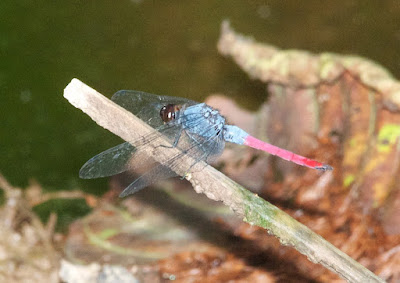



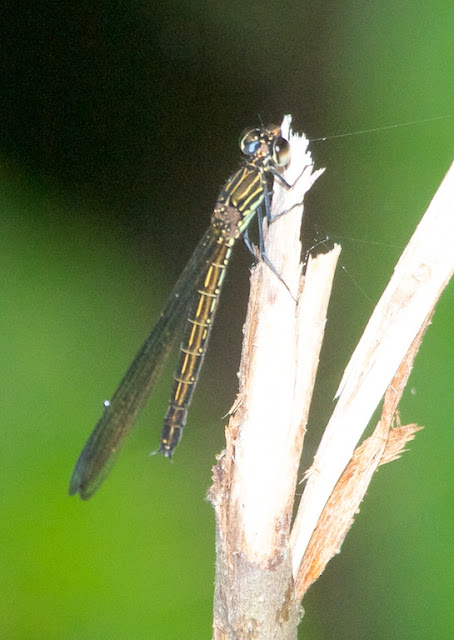





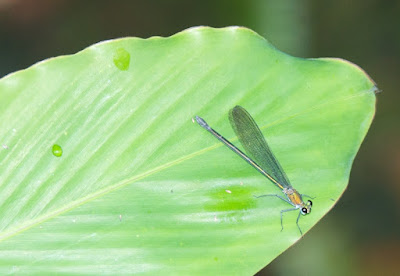





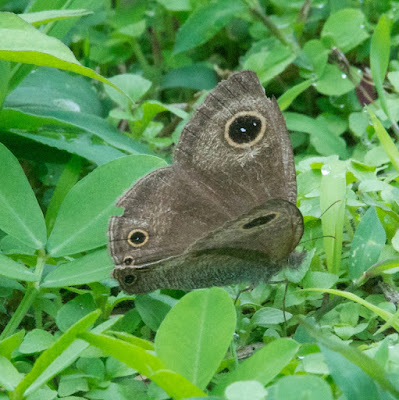



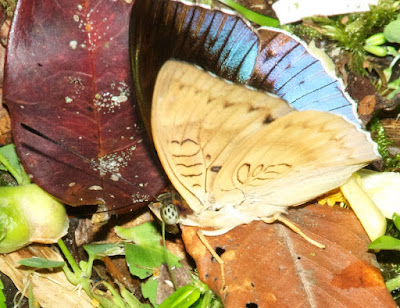














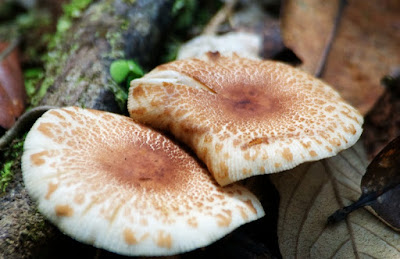


No comments:
Post a Comment